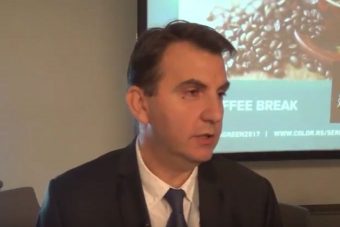
UNIDO (United Nations Development Organization) is the United Nation’s specialised agency that promotes sustainable industrial development. UNIDO encourages the reduction of poverty in developing countries, as well as development of economy in transition. These commitments were defined in Lima Declaration in 2013 on the UNIDO’s General Conference. This organization in cooperation with companies provides consulting services in addition to technical. In our country, Cleaner Production Centre of Serbia within Belgrade’s Faculty of Technology and Metallurgy conducts mentioned activities. Each socially responsible company, that takes care of the environmental protection can be included in these programs and improve its business but, as our interlocutor PhD Branko Dunjic, executive Manager of Cleaner Production Centre of Serbia says, it is not the case. There are factors that affect the companies’ lack of interest and forming of the opinion that this is irrelevant and secondary thing.
EP: Cleaner Production Centre of Serbia exists within the framework of UNIDO’s project. You held a number of seminars and trainings for over 70 companies. Can you tell us more about the centre and the results of your work?
Branko Dunjić: Cleaner Production Centre of Serbia was founded in 2007 and it operates within the framework of Faculty for Technology and Metallurgy, University of Belgrade. The Center is at global level a part of UNIDO/ UNEP’s network of Centres for raw material efficiency and cleaner production (RECP Net). So far, it has helped in the application of methodology of raw material efficiency and cleaner production in more than 70 companies in Serbia and has trained 64 experts for cleaner production. In addition to projects in Serbia, the Center successfully provides consulting services abroad. For the last four years the Centre has been cooperating with International Finance Corporation (IFC) on different projects of raw material and energy efficiency in Serbia, Russia, Croatia, Kazakhstan, Uzbekistan, Ukraine and Bosnia and Herzegovina. The Center cooperates with the Government of the Republic of Serbia, and it has successfully prepared and implemented the project ‘Environmentally sound management and final disposal of PCB’ funded by Global Environment Fund (GEF).
Project ‘Implementation of IPPC/IED Directive in facilities for intensive rearing of poultry and pigs’ started in April 2015. Cleaner Production Centre and Faculty of Technology and Metallurgy implements this project in collaboration with the Ministry of Agriculture and Environmental Production of the Republic of Serbia and with financial assistance of the Embassy of Sweden in Belgrade. The basic objective of the project is to support authorities of the Republic of Serbia and operators to adopt sustainable approach for implementation of IPPC/IDE Directive in facilities for intensive rearing of poultry and pigs. At global level our Centre has become a part of newly established network of centres for efficient use of resources (RECP Net) which is jointly supported by UNIDO and UNEP. Cleaner production Centre has become regional coordinator for all projects of raw material efficiency and cleaner production in the Balkans from 2014. In the project ‘Chemical Leasing‘ which introduces a new business model in the management of chemicals, our Centre has been participating under auspice of UNIDO since 2007.
The Centre has received many international awards for the achieved results in introducing of the business model in competition with more than 50 organizations from 20 countries among which are a few gold and silver medals. We have also received an award for the best Centre in the world that implements this project. The partners ‘Knjaz Miloš’, ‘Ecolab’, ‘Henkel’ and ‘Bambi-Banat’ have also got medals. Your readers should visits sites www. chemicalleasing.com, www.cpc-serbia.org for detailed explanations of the business models. So far (2006-2015), this project has included 70 companies with 40,000 employees and the average amount of savings per company (not including the project with EPS) amounts to 100,000 € per year with:
– Average reduction of water consumption: 50,000 m3/year.
– Average reduction of energy consumption: 500 MWh/year.
– Average reduction of CO2 emission: 500t/year.

EP: Which companies have applied your methodology and in what way do you start cooperation with new companies? What did these companies change in their operation after the training and is there a way to monitor and evaluate the implementation of methodology?
Branko Dunjić: Among the companies that have successfully implemented the methodology with our help are; ‘Metalac’, ‘Knjaz Miloš’, ‘Imlek’, ‘Carnex’, ‘EPS’, ‘ZvezdaHelios’, ‘Bambi-Banat’, ‘Štark’, ‘Maxima’, ‘Sojaprotein’, ‘Tarkett’, ‘Umka’, ‘Chemical Agrosava’, ‘Galenika Fitofarmacija’, ‘Unipromet’, ‘Delta-Agrar’, as well as companies from the cities of Pančevo and Čačak. As a rule the best, companies adopt and apply methodology of raw material efficiency and clean production in the best way. Six months after the completion of the project, our trained experts visit companies and take interest in the actual implementation of cleaner production options. These companies retain the team that was formed during the training process and they continue with systematic analysis approach of material and energy balance and constant improvements.
Experience tells us that these projects whose investment value is under 5,000 €, are almost fully implemented, while the percentage of implemented projects of 50,000 € investment value is 60%, and the ones whose investment value is over 50,000 € is around 30%. The upper limit of repayment period of investment in cleaner production measures, that is acceptable for our companies, is about 3 years. At the beginning, we started cooperation with companies after series of information seminars throughout Serbia, and through personal contacts. Now, the companies increasingly emerge alone, but still the biggest part of projects is co-financed by different donors (UN, IFC, bilateral help).
EP: Is cleaner production in Serbia sufficiently represented and what are your impressions from the terrain? What are the main obstacles and problems in terms of environmental protection in order for factories to be responsible in the long run?
Branko Dunjić: Absolutely not. Most of our companies see clean production as unimportant, secondary thing, while it actually represents a serious business strategy, sustainable in the long term. Business strategy that is based on corporate stewardship, constant evaluation and advancement, and curiosity. The Strategy based on the responsibility towards yourself, the environment, natural resources, and future generations. Truth be told, our colleagues from all over the world say that they have the same situation. Again I can say that the best and the most successful companies have the best integrated principles of cleaner production.
The main obstacles are obsolete technologies and lack of money. Our industry lost pace and money in the last decade of the XX century. So now it is forced to work inefficiently, losing money through excessive and inefficient energy consumption, raw materials, chemicals and water. There are no financial incentives for the introduction of clean production, and you can also notice insufficient law enforcement. At the same time, water and energy prices are relatively low (although these prices are too expensive for some!), and this additionally contributes to the lack of interest of companies for this type of projects. All this leads to some type of apathy and disbelief in the possibility of change, and that is the reason why certain improvements that don’t cost anything are not implemented.
Interview by : Vesna Vukajlović
This interview was first published in bulletin “Responsible Companies Environmental Protection” on March 2016.


